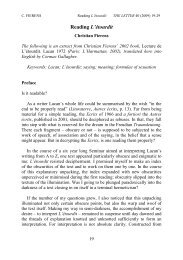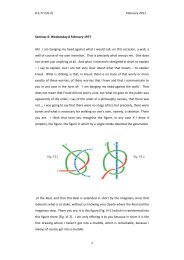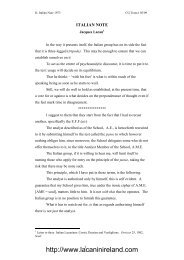Seminar XXIV Final Sessions 1 - Lacan in Ireland
Seminar XXIV Final Sessions 1 - Lacan in Ireland
Seminar XXIV Final Sessions 1 - Lacan in Ireland
You also want an ePaper? Increase the reach of your titles
YUMPU automatically turns print PDFs into web optimized ePapers that Google loves.
Ala<strong>in</strong> Didier Weill, for his part, it is not that he substitutes himself, heidentifies himself to Bozef. He feels himself, he feels himself <strong>in</strong> the Passe,it is rather curious that he could, <strong>in</strong> a way <strong>in</strong> this writ<strong>in</strong>g, f<strong>in</strong>d, as I mightsay, the call that answered for me, made me answer by the Passe.The Real that is at stake, is the knot <strong>in</strong> its entirety. S<strong>in</strong>ce we are speak<strong>in</strong>gabout the Symbolic, it must be situated <strong>in</strong> the Real. There is, for this knot, acord. The cord is also corps-de (body-of). This corps-de, is parasited on bythe signifier; for the signifier though it forms part of the Real, it is <strong>in</strong>deedthere that I am right to situate the Symbolic, one must th<strong>in</strong>k of thefollow<strong>in</strong>g, which is that we might well have deal<strong>in</strong>gs with this corps-de only<strong>in</strong> the dark. How could we recognise, <strong>in</strong> the dark, that it is a Borromeanknot? That is what is at stake <strong>in</strong> the Passe. ‘I know that he knows’, what canthat mean except to objectify the unconscious, except for the fact that theobjectification of the unconscious necessitates a redoubl<strong>in</strong>g, namely, that ‘Iknow that he knows that I know that he knows’. It is on this condition alonethat analysis holds onto its status. This is what creates an obstacle to thissometh<strong>in</strong>g which, by limit<strong>in</strong>g itself to ‘I know that he knows’, opens thedoor to occultism and telepathy. It is because of not hav<strong>in</strong>g sufficientlygrasped, sufficiently well grasped the status of anti-knowledge, namely, ofthe anti-unconscious, <strong>in</strong> other words of this pole, of this pole whichconsciousness is, that Freud allowed himself from time to time to be tickledby what have s<strong>in</strong>ce been called ‘psy’ phenomena, namely, that he allowedhimself to slip quite gently <strong>in</strong>to delusion, <strong>in</strong> connection with the fact thatJones gave him his visit<strong>in</strong>g card immediately after a patient had casuallymentioned Jones’ name.The Passe that is at stake, I only envisaged <strong>in</strong> a tentative way, as someth<strong>in</strong>gwhich means noth<strong>in</strong>g but a ‘recognis<strong>in</strong>g one another’, if I can expressmyself <strong>in</strong> that way, on condition that we <strong>in</strong>sert <strong>in</strong>to it an ‘a-v’ after the firstletter ‘recognis<strong>in</strong>g one another between knowledge (se reconnaître entres(av)oir)’. Are there tongues that are an obstacle to the recognition of theunconscious? This is someth<strong>in</strong>g that was suggested to me as a question bythe fact that this ‘c’est toi’, <strong>in</strong> which would have Bozef communicat<strong>in</strong>g with88














